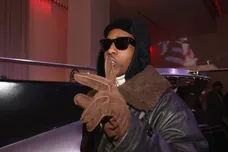When he got signed to Capitol Records, the music industry was buzzing about the endless career possibilities of then-18-year-old Bronx drill rapper Kay Flock. There was something about him. His delivery was crisper, cleaner, and more melodic than some BX drill counterparts. His energy was frenetic - almost manic - and his attitude was so big that it jumped out at you from the screen.
For better or worse, it made him hard not to watch. Later, he reportedly earned himself a rumored $3 million record deal with Capitol. All of that came to a crashing halt on December 16th, 2021. The OY territory of the Sugar Hill area in New York erupted in a brief hail of bullets that would inevitably end in the death of Oscar Hernandez. The alleged shooter?
What Is Kay Flock Charged With?
What started as a shooting that Flock’s lawyer called an act of self-defense has snowballed into far more than one charge to beat. Since his arrest, as his court case continued to get pushed back, the Feds built a case against him far more considerable than anticipated. In late February 2023, a little more than two years after initially turning himself in, Flock was indicted on RICO charges that range from racketeering to attempted murder to murder and now faces a mandatory life sentence in prison.
But asking why Kay Flock is in jail isn’t quite as simple as reading the charges, skimming the indictment, and attempting to understand the facts. To answer the question, you must peel back far more layers than what can be discovered through headlines. To understand why Kay Flock is in jail, you have to understand where Kay Flock comes from, what drill music is, how the music industry uplifts artists they know will be worth more dead than alive – and how the federal justice system utilizes all of that to their advantage when building RICO cases.
Drill Music
Drill music first entered the mainstream in Chicago in the early 2010s. The combination of dark, grimy UK beats and gritty lyrics made artists like King Louie, Chief Keef, and Lil Reese household names. This helped put drill on the map itself on the map. When you live outside the world it was created in, drill music feels like nothing more than a soundtrack for a lit night. The hypnotic beats have a primal quality that allows listeners to disappear in the music. It puts you in a trance that translates into a hangover the next morning and a few good stories to tell. When you live outside of the world that drill music was born from, the lyrics are simply that - lyrics.
For the rappers behind the lyrics, though, the content of the songs can reflect real life. They can read as literal playbooks of what crews have done, could do, or will do. This primarily pertains to their opps, their opps friends, and anyone who tries to oppose them. Bar after bar would be littered with disses to dead opps. As time passed and drill grew in popularity, many artists began using the music as their ticket out.
Kay Flock's Crew The OGz
The opposite felt true for the rapid rise of rapper Kay Flock. Flock and his crew agree that Kay wasn’t initially interested in rapping. He reportedly only picked up the mic under the encouragement of one of his closest friends and fellow crew member, who was convinced Flock could funnel his energy, personality, and talent into music. Were it not for that encouragement, it seemed that Flock was content being who he was. Based on his IG lives and social media presence, Flock was a soldier.
Details of Flock’s early life have been nearly impossible to find, and he hasn’t come forth with any information. It seems he's kept his blood family (besides his cousin, DThang) a tight-lipped secret. The only family he’s known to have is the self-formed family of his crew, the OGz. The crew formed after the bloody murder of their leader Juu Hef in front of a BX nightclub in August of 2013.
Before Juu’s death, the OGz were part of a more prominent gang, the YGz. They ruled most of the Courtland Ave area. During a large disagreement between leaders, groups began to splinter off, creating their own offshoots. When the core began to splinter, it allowed the Feds to infiltrate the ranks. After more than a year of an undercover operation, many gangs were swept up in Operation Rotten Apple. The Courtland Ave housing projects were targeted, and many residents considered “gang affiliated” were swept up in a federal indictment in 2009. Over 50 people were charged in the indictment. The sweep led to most older affiliates being taken off the streets. This left young members of the crews to their own recognizance.
The Bronx's Dangerous History
This massive wave of crime and violence in the 2010s and 2020s is not the first time the Bronx has been considered a “warzone.” In the '70s, the Bronx was burning due to arson fires, gang wars, and petty crime. The neighborhood had been suffering through decades of changes that left the borough lacking resources.
The neighborhood had seen a flood of new residents since the 40s. This was a direct consequence of Operation Bootstrap in Puerto Rico which caused mass migration to New York. The redlining, redistricting, and “urban renewal” policies made the influx of residents too much to bear. Additionally, the massive budget cuts to the city in the '70s contributed to the shift.
During the arsons of the '70s, reports indicated that police officers would sit and watch the buildings burn rather than call in emergency services. Perhaps because they knew the fire was too far gone. Or, many viewed the Bronx as better dead than alive. The cycle repeats in modern times in the case of Kay Flock, specifically his RICO case.
Details Of Kay Flock's Case
On Dec 16th, Flock was walking through Sugar Hill when Oscar Hernandez reportedly spotted him, known in BX as OY Waka. After being seen, CCTV camera footage captured Hernandez leaving the barber shop he had been in and began following Flock. While both walk off camera as the altercation occurs, it's less than a few minutes before shots are fired. Hernandez was hit in the back and the neck.
He succumbed to his injuries days later. Hernandez was 16 years old. On December 23rd, Flock turned himself in to the NYPD, and he was charged with first-degree murder. Between his incarceration in 2021 to now, we’ve seen the case intensify as the RICO indictment was handed out. If Flock is found guilty, he will have a mandatory life sentence. He also faces any additional sentences that may come from various charges attached to the RICO case.
RICO cases are often targeted tools, ones that have far deeper implications. Recent instances include Cop City, Young Thug, and gentrification in Atlanta. One wonders if similar situations will begin to be mimicked throughout the music industry. We’ll continue to follow the case as it develops.









